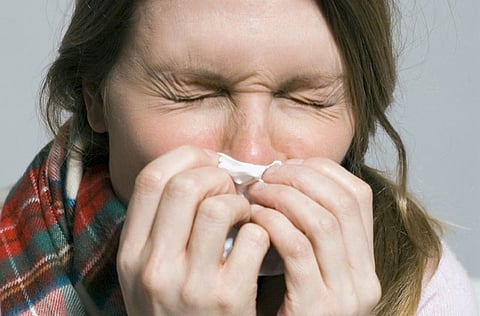Treating a common cold
Three different practitioners give their advice on treating a common head cold

General practioner
Dr Rubina Muneeb,specialist family medicine,Medcare Medical CentreJumeirah (04-3953115).She says:
A "The symptoms of a common cold include runny nose, sore throat, sneezing, coughing, a general feeling of tiredness and sometimes fever and headache. The most effective measure to prevent spread of infection is through frequent hand washing; covering the mouth and nose while coughing and sneezing; disposing of used tissue papers properly; and not sharing utensils.
"The common cold is a self-limiting infection and its symptoms usually resolve within seven to ten days. There is currently no known medicine that shortens the duration, but supportive treatment can help manage the uncomfortable symptoms while the body's immune system is trying to fight the infection. This includes drinking plenty of fluids, steam inhalations, salt water gargles, pain killers, and decongestants.
"Antibiotics are not effective against viral infections and are not recommended for common colds. Anyone with more severe symptoms, such as high grade fever, consistent cough, breathing problems or chest pain, should seek medical advice."
Alternative therapist
Dr Maria Ridao Alonso is medical director and head of traditional Chinese medicine at Dubai Herbal and Treatment Centre (04-3351200). She says:
A "As soon as the symptoms of a head cold appear, you should increase your fluid intake to between 2 litres and 2.5 litres per day, to help prevent a thickening of mucous and sinusitis (warm or room temperature, not cold). Tea with ginger, lemon and a teaspoon of honey would be a good choice. Avoid milk, yoghurt and bananas as they increase phlegm production.
"Rinsing the nose and gurgling with saline solution are efficient first line treatments, and they are good preventative measures - especially when everybody around you is infected. If a stuffy nose is the main symptom, inhalation or steaming is recommended - either with salt water, or by adding mint and chamomile to the water. Multi-vitamins and probiotics will help boost the immune system.
"If symptoms do not improve after three days, or fever develops, see your doctor. Antibiotics are not usually necessary for a head cold. There are many effective herbal medicines and acupuncture can give immediate relief."
Ayurvedic doctor
Dr Deepa Dhavjekaris general manager at Thai Privilege Spa, Jumeirah (04-3489679).
She says:
A "This season, head colds have been making the rounds causing a lot of people to sniffle through the start of the year. Head colds are a result of faulty diets and are also commonly witnessed among those who suffer from acidity as well; therefore, a diet change should include large amounts of fruit juices, to neutralise the condition of the blood, and hot drinks to help clear the kidneys.
"At Thai Privilege Spa, clients are served several different kinds of herbal teas when they arrive and after treatments. One of the best for those suffering with colds is ginger tea, which can help treat cold symptoms, such as fever, sore throat and blocked sinuses.
"Regular detox treatments can help rid the body of toxins and ward of flu and colds. At Thai Privilege Spa we use an ancient Thai detox therapy called the Hot Salt Pot treatment. A warm Thai clay pot is filled with sea salt, which is massaged on to the body to assist in detoxification and reduce water retention. The temperature re-energises your body to ward off infections." A
There are over 200 different types of viruses known to cause common colds. The infection spreads through either breathing invisible droplets in the air containing common cold viruses, for example if someone sneezes near you, or by touching a contaminated surface and then touching the nose or eyes.
Once the virus droplets have entered the nose area, they pass along the nasal tracts to the adenoids, which are high up behind the nose. Here, they attach to virus receptors and start to develop into an infection, usually carried in nasal secretions. This whole process takes between eight and 12 hours.
Once infected, the person will be most contagious for the first three days, at which point the infection normally peaks and starts to subside.
Symptoms include having a runny or stuffy nose, headaches, teary eyes, sneezing and throat pain.
The average adult will suffer two to four colds per year, while the average child will experience up to ten.
Got a question for our experts?
Email us at aquariusedit@alnisrmedia.com


